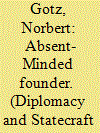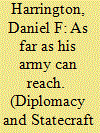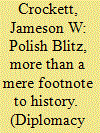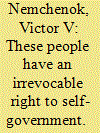|
|
|
Sort Order |
|
|
|
Items / Page
|
|
|
|
|
|
|
| Srl | Item |
| 1 |
ID:
093624


|
|
|
|
|
| Publication |
2009.
|
| Summary/Abstract |
This article examines Norwegian policy vis--vis the United Nations (UN) through the end of 1945. From here it will become clear that framing foreign policy orientations of the 1940s along conventional lines exaggerates the commitment of Norwegian politicians to two grand ideas. The novel idea of Atlantic alignment, developed by Norwegian circles in London exile, was more ambiguous than generally acknowledged and left room for universal extension. By contrast, the alleged turn in the mid-1940s toward support of the UN was in the form of lip-service as opposed to action that would have engaged actors from Norway. The government outsourced policy-making on the issue to a small circle of experts and made no attempt to exert leadership in regard to UN matters. Norway's indifference toward the UN in the 1940s stands in marked contrast to the country's later reputation as a faithful supporter of the world organization.
|
|
|
|
|
|
|
|
|
|
|
|
|
|
|
|
| 2 |
ID:
093621


|
|
|
|
|
| Publication |
2009.
|
| Summary/Abstract |
This article explores the diplomatic implications of United States troop movements in Germany before and after V-E Day. Existing accounts emphasize American good will and Soviet refusal to cooperate, pointing to the example of an American convoy en route to Berlin in June 1945. Citing an "agreement" of which the American convoy commander had never heard, the Russians would allow only one-half of his troops to proceed. The agreement did exist, however, and the episode must be seen against the backdrop of Soviet suspicions regarding Western willingness to withdraw from the Soviet occupation zone. United States President Harry S. Truman did overrule British Prime Minister Winston S. Churchill's calls to link withdrawal to concessions from the Soviets, but he waited two months before doing so. Prior accounts have ignored the delay's effects on Soviet perceptions. The article argues that American actions had the unintended consequence of reinforcing Soviet Chairman Joseph V. Stalin's belief in Western bad faith.
|
|
|
|
|
|
|
|
|
|
|
|
|
|
|
|
| 3 |
ID:
093627


|
|
|
|
|
| Publication |
2009.
|
| Summary/Abstract |
Canada's 2005 International Policy Statement announced that the Department of Foreign Affairs and International Trade and the Department of National Defence and the Canadian Forces were committed to "whole of government" interventions in failed and fragile states. This led both the Canadian government and outside observers to declare that Canada was successfully harmonising the aims and practices of its internationally focused departments and crafting a synergised approach to interventions in failed and fragile states. Drawing on Halperin and Clapp's organisational theory of bureaucratic politics, this paper argues instead that the foreign affairs and defence departments embraced the idea of failed and fragile states to reinforce their organisational essences and recycle their existing missions, roles, and capabilities. In addition, the departments used a "whole of government" approach to secure their autonomy, fence their respective functions, and enlarge their unique capabilities, under the guise of greater efficiency.
|
|
|
|
|
|
|
|
|
|
|
|
|
|
|
|
| 4 |
ID:
093625


|
|
|
|
|
| Publication |
2009.
|
| Summary/Abstract |
As British Prime Minister, Edward Heath is generally believed to have presided over a distinct cooling in Anglo- American relations. His frosty personality, use of the term "natural"-instead of "special"-relationship, and determination to re-orient British foreign policy towards the European Community are felt to have deliberately foreclosed a more intimate partnership with the administration of Richard Nixon. This interpretation is captured most vividly in the writings of the President's National Security Adviser, and later Secretary of State, Henry Kissinger. In contrast to such views, this article argues that despite considerable challenges, Anglo- American relations during Heath's premiership were not fundamentally weakened. Nor can Heath be considered "anti-American." Moreover, the frictions experienced were often the result of American actions rather than anything which happened in London. A new understanding of Heath's actions and the circumstances of the time are needed when assessing the "special relationship" in this period.
|
|
|
|
|
|
|
|
|
|
|
|
|
|
|
|
| 5 |
ID:
093630


|
|
|
|
|
| Publication |
2009.
|
| Summary/Abstract |
On account of Spain's long-standing claim to the sovereignty of the British Overseas Territory of Gibraltar, "the Rock" remains one of sixteen non-self-governing territories on the United Nations list awaiting decolonization. This article examines the principles of self-determination and territorial integrity adopted by the United Nations in consideration of the issue of decolonization as they have been applied to Gibraltar, together with the consequences for the parties concerned. With the fiftieth anniversary of the first United Nations Resolution on decolonization on the horizon and the recent adoption by Gibraltar of what is considered to be a non-colonial constitution, the article suggests that it is timely for the United Nations to consider taking a more flexible approach to Gibraltar's status that would put to one side Spain's claim but allow Gibraltar to be removed from the UN list.
|
|
|
|
|
|
|
|
|
|
|
|
|
|
|
|
| 6 |
ID:
093619


|
|
|
|
|
| Publication |
2009.
|
| Summary/Abstract |
The January 1933 appointment of Adolf Hitler as Chancellor of Germany marked the beginning of the end of the fragile post-war peace throughout Europe. The Polish leadership had good reason to fear his threats of revising the Treaty of Versailles. Realising that Hitler was too dangerous to remain in power, the Polish leadership led by Marshal Jzef Pisudski prepared for a preventive war against Germany. Unfortunately, the appeasement policy among the Western Powers condemned this plan to failure and forced Poland into signing a non-aggression pact with Germany in 1934; thus dooming Poland's existence. To test his premonitions about Hitler, Pisudski created several international "incidents" concerning the Free City of Danzig, designed to test both Germany and whether the Western Powers would fight to uphold the Treaty of Versailles. Pisudski's efforts offer proof that Poland deserves more credit for its determination to deal with a rising tide of Nazi Germany.
|
|
|
|
|
|
|
|
|
|
|
|
|
|
|
|
| 7 |
ID:
093622


|
|
|
|
|
| Publication |
2009.
|
| Summary/Abstract |
Upon entering office, Carter Administration officials placed a heavy emphasis on integrating human rights into United States foreign policy. They also sought to contain festering Arab-Israeli tensions in the Middle East. The intersection of these two issues was the Israeli-Palestinian conflict. This article examines the Administration's attempts to solve that conflict and to bring peace to the region. It argues that policymakers developed a sincere dedication to safeguarding Palestinian rights, but that their understanding of those rights was limited in scope and defined through the lens of United States security and strategic interests. In spite of a good-faith effort to satisfy Palestinian desires while maintaining a constructive relationship with Israel, the Administration ultimately failed to alter the status quo because of regional developments. As Washington's strategic thinking changed, so did the urgency of Palestinian rights.
|
|
|
|
|
|
|
|
|
|
|
|
|
|
|
|
| 8 |
ID:
093628


|
|
|
|
|
| Publication |
2009.
|
| Summary/Abstract |
This article challenges the legitimacy of electoral results in post-war Greece, as well as the political orientation of the Greek people and proves that the issue of United States intervention in Greek politics is not fabricated. Although particular emphasis is given to electoral systems and results, this study also investigates the so-called conspiracy theories that relate such information and events to the installation of dictatorship that marked Greece's long lasting instability. Despite the fact that the years of dictatorial rule are not central to this examination, the causes of the dictatorship are related to both foreign intervention and the Greek "political culture."
|
|
|
|
|
|
|
|
|
|
|
|
|
|
|
|
|
|
|
|
|